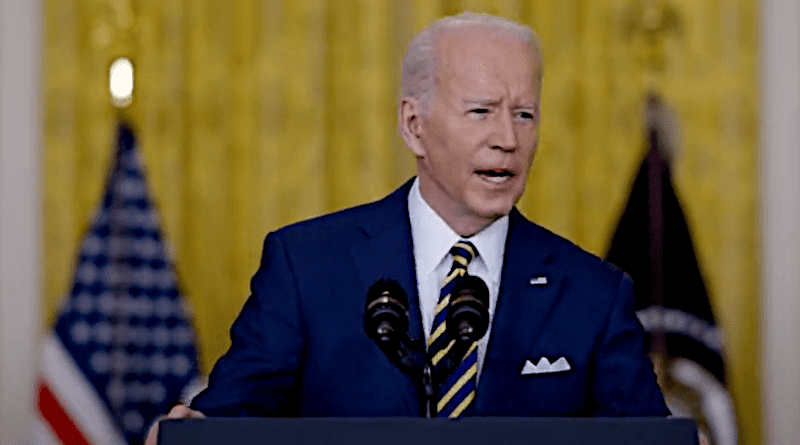
The Great American Divide – Analysis
By Observer Research Foundation
By Vivek Mishra
University campuses across the country are ablaze with protests, reminiscent of the anti-war demonstrations during the Vietnam War era. The scenes emerging from America’s leading universities, and increasingly from smaller institutions nationwide, reflect a profound ideological and political chasm that permeates American society across educational, business, trade, political, and even entertainment spheres.
However, a notable distinction arises between the sentiments stirred during the Vietnam War and those in the current context of the Gaza conflict. The former sought a disengagement of the United States (US) from the war, while the latter seeks a change in the US’s approach to the ongoing conflict in the Middle East and the use of its financial and political clout to bring the war to a halt.
Arguably the most significant difference lies in the generational gap between older Americans, particularly those born in the 1960s, and their relatively younger counterparts, specifically Millennials and GenZ. Today’s younger American populace finds itself distanced from the complexities of Israel’s challenges in its region, often viewing it solely as an ‘occupier’ of Palestinian land. Conversely, the older generation, including President Biden’s cohort, holds a different perspective on Israel, shaped by America’s historical commitments to safeguarding a homeland for persecuted Jewish people. They are deeply influenced by the foundational assurances America provided to Israel, pledging to prevent the recurrence of historical injustices against the Jewish community. This contrast underscores a fundamental divergence in how different generations perceive and relate to the ongoing conflicts involving Israel, reflecting broader societal shifts and historical contexts.
The political and ideological currents sweeping across the US, including its premier universities, signal a notable shift in the nation’s sociocultural landscape. There has been a resurgence of the American New Left, propelled by new wars and changes in the country’s demographic makeup. This transformation is largely fuelled by nearly continuous waves of migration since the turn of the century, with a pronounced surge in the last decade. While America has a long history of immigration, the past decade has witnessed an unprecedented increase in illegal migration, driven primarily by factors such as conflict, climate change, and economic and democratic aspirations.
These changes unfolding in the American political landscape have at least two significant implications. The first is the political divide. The Biden administration and the broader Democratic party perceive immigration as both an opportunity and a challenge. However, in recent years, there has been a disproportionate emphasis on the challenges, exacerbated by the influx of approximately 7.2 million illegal immigrants during the Biden administration. This presents an opportunity for Republicans to exert pressure on Democrats regarding immigration, potentially making it a central issue in the upcoming November 2024 presidential election.
On the conservative end of the political spectrum, immigration has served as a catalyst for the “rise of the right” worldwide, and America is no exception to this. If anything, it is representative of the apex of that shift. Indeed, anti-immigration sentiments in the West first, and then the economic downturn during the COVID-19 pandemic, have contributed to the sustained popularity of Donald Trump and the Republican party in the US.
The second issue is geopolitical in nature and revolves around the level of political support the US should extend to Israel amid the ongoing Gaza counteroffensive led by the Netanyahu government. The pressure on the Biden administration is multi-pronged: providing military and financial support to Israel, extending aid to Gaza, preventing Israel from going ahead with the Rafah offensive, ensuring freedom of speech back home and perhaps most importantly, achieving a ceasefire in Gaza. If any of these constraints go out of the orbit for the US, the repercussions could significantly impact the political fortunes of the Biden administration. Enmeshed in a spiralling maze of tunnel networks in Gaza, Israel has been unable to find closure to a war that is now in its sixth month with mounting civilian death tolls. Biden faces opposition to his Gaza policy and support for Israel by his own party members such as those on the progressive end.
Biden’s dilemma regarding Israel has been exacerbated by a growing blurred distinction between peace movements and antisemitism within the country. The constitutional mandate of ‘freedom of speech’ in the US sometimes fails to fully consider the complexities of the Middle East and appears discordant with regional realities on the ground, when nations like Saudi Arabia and Egypt have themselves suppressed pro-Palestinian protests domestically.
The US is inevitably encountering situations where its liberal principles clash with a conservative coalition that now unites several countries globally, particularly notable in the Global South. The expansion of democratic rights stemming from the American Constitution now encompasses a population with a higher representation from the Middle East than ever before. Consequently, the complex regional politics of the Middle East are finding expressions within the US.
Internationally, these tensions are evident in the efforts of the Democratic Biden administration to manage or restrain politically conservative governments whose policies frequently diverge from theirs. The global rise of the political right, mirrored in governments worldwide and shifting demographics, has consistently presented challenges for the Biden administration, which finds itself positioned on the opposite side of the political spectrum. Handling Israel under the leadership of a deeply conservative Netanyahu government represents the ultimate test for the Biden administration’s ability to navigate competing interests at home, many of which converge in the Middle East.
Worldwide, the spectrum of democracies may have broadened; however, America remains steadfast in its adherence to and implementation of democratic ideals, often leading to discord with other democratic nations. Canada, originally modelled on the ideals established by the American constitution, now finds itself potentially influencing a trend reversal, wherein America risks mirroring Canada’s role as a platform for global discontent. Consequently, elite American universities today serve as mere microcosms of the broader American society. It is probable that in the next decade, the shifting demographic landscape of America will deepen divisions not only within the electorate but also across cultures, traditions, and norms.
- About the author: Vivek Mishra is a Fellow at the Observer Research Foundation.
- Source: This article was published by the Observer Research Foundation.

Observer Research Foundation
ORF was established on 5 September 1990 as a private, not for profit, ’think tank’ to influence public policy formulation. The Foundation brought together, for the first time, leading Indian economists and policymakers to present An Agenda for Economic Reforms in India. The idea was to help develop a consensus in favour of economic reforms.





